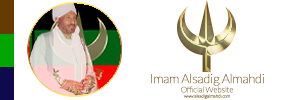Sudan Opposition Leader Speaks Out
Government Criticized for Resisting U.N. Deployment in Violent Darfur
By Jasper Mortimer
Associated Press
Thursday, March 1, 2007; A14
CAIRO, Feb. 28 — The main Sudanese opposition leader said the government is refusing to allow U.N. peacekeepers into the violent Darfur region because it believes the troops would help hunt down war crimes suspects for the International Criminal Court.
Former prime minister Sadiq al-Mahdi said the government’s other reason for rejecting U.N. forces is that it still believes it can defeat the Darfur rebels.
In an interview while visiting Cairo, Mahdi challenged the government’s official line in the standoff with the U.N. Security Council — that it supports the May peace accord and that U.N. forces in Darfur would constitute a “colonialist” attempt to subjugate the country.
U.N. Secretary General Ban Ki Moon is still waiting for Sudanese President Omar Hassan al-Bashir to reply to a Jan. 24 letter that put forward specific proposals for the deployment of 22,000 U.N. and African Union troops to Darfur, the vast western region of Sudan where more than 450,000 people have died from disease and violence and 2.5 million have fled their homes in four years of fighting.
The Security Council initially ordered the deployment in August.
In a report to the Security Council on Wednesday, Ban called on Sudan to stop aerial bombings in Darfur that have killed innocent civilians. He also highlighted escalating violence against aid workers.
On Tuesday, the chief prosecutor at the International Criminal Court accused Sudan’s state minister for humanitarian affairs, Ahmad Muhammad Harun, of war crimes and crimes against humanity in Darfur, saying he paid and recruited militiamen responsible for murder, rape and torture.
The prosecutor also said the militia concerned, the Janjaweed, was armed and financed by the government — an accusation that officials in Khartoum have always denied.
The government rejected the prosecutor’s remarks and reiterated that it would not surrender anybody for trial at the court.
Mahdi, whose Umma Party traditionally wins the plurality of votes in Sudan’s elections, dismissed the sovereignty argument as inapplicable to gross abuse of human rights. “Atrocities have been committed and those who committed them have got to be brought to book,” he said.
Mahdi, whose government was toppled in a 1989 military coup led by Bashir, is known to have influence in Darfur. In the 1986 elections — the last to be considered free and fair — the Umma Party swept Darfur by a landslide.
He is also the great-grandson of the Mahdi, the 19th-century nationalist who ousted Egyptian colonial forces under the British general Charles Gordon. Darfur played a major role in that rebellion, and many of its tribal elders today revere Sadiq al-Mahdi because of his illustrious ancestor.
Top of Form
View all comments that have been posted about this article.
Bottom of Form
© 2007 The Washington Post Company
http://www.washingtonpost.com/ac2/wp-dyn/comments/display?contentID=AR2007022802052

